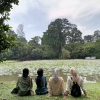For fifty years, Indonesia and South Korea have established diplomatic relations since 1949, which were initially based on trade in goods and services but, have now developed rapidly and given birth to cooperation agreements that have spread to various sectors. This collaboration became even more massive when the Korean Wave (K-wave) came to Indonesia, which was supported by the influence of globalization and developments in information and communication technology which helped the spread of the K-wave itself.
The introduction of K-wave received a positive response from the Indonesian people and brought benefits to the country, however, behind these benefits, there were losses. The state discovered the negative impact of the K-wave which was destructive on the socio-cultural life of the community, namely a shift in native Indonesian culture which was replaced by Korean cultural trends, so that most people were very consumptive of foreign goods rather than domestic goods. Therefore, for every import activity, the government enforces fairly strict trade policies to maintain stability between public demand for foreign products and domestic Indonesian products so that they can compete.
Trade policy is any state or government action, either directly or indirectly, to influence the structure, direction, composition and form of foreign trade or trade activities (Esa Unggul University Lecturer Team, 2020). Indonesia uses protection policies such as tariffs and non-tariffs, the Indonesian SIS-POM policy, and the installation of the MUI halal label. These policies will be explained below.
1. Tariffs and Non-Tariffs
Tariff barriers are systematic arrangements of duties levied on goods and services that cross national borders. Import and export taxes are imposed to increase the cost of importing certain goods. For domestic consumers, this method can reduce demand for imported goods because they are more expensive. Tariff policy is the application of high tariffs to imports of certain goods. This policy is expected to help domestically produced goods increase their competitiveness in the market so that consumers not only buy imported goods, but also buy domestically produced goods. So, tariff barriers are a form of trade barrier imposed by a country in the form of taxes or import duties on imported goods. The aim is to protect domestic industry from competition from cheaper imported goods.
Usually tariff barriers are divided into three groups, namely:
1) Exemption from import duties or subject to low tariffs, namely the application of tariffs of 0% - 5% of the product price, especially for basic and vital necessities. Examples include food needs such as rice, noodles, and others.
2) Medium tariff, this tariff applies a tariff of > 5% - 20% for semi-finished goods and other goods that are not yet produced enough domestically.
3) High tariffs, namely the application of tariffs above 20% on luxury goods and other goods that are only produced enough in the country and goods that are not basic necessities. Examples include clothing needs in the form of branded clothes.
Meanwhile, non-tariff barriers are all forms of trade barriers other than tariffs that are not in the form of taxes. This type of barrier can affect the flow of goods and services across countries. Examples are import quotas, import licenses, or product quality standards such as checking SNI, BPOM, and Halal Certification.
2. SIS-POM Indonesia
SIS-POM or Food and Drug Control System in Indonesia has been established with responsibility and responsibility in consumer protection, namely called BPOM (Food and Drug Control Agency), BPOM is a non-departmental government institution established through presidential decree No. 166 of 2000 which was later amended by presidential decree No. 178 concerning position, duties, functions and authorities, organizational structure and work procedures of non-departmental government institutions. As a non-departmental government agency, BPOM is under the president and responsible to the president, BPOM has been carrying out regulatory functions as a form of representation from the government. The supervision of drugs and food in question includes supervision of therapeutic products (drugs), narcotics, psychotropics, addictive substances, traditional medicines, cosmetics, complement products and supervision of food safety and hazardous materials. (Aziz, 2020).
Based on an online check that I did on the official website of BPOM (https://cekbpom.pom.go.id), one of the imported products from Korea that entered Indonesia, namely Cosrx and Buldak Samyang Sauce, was proven to have gone through checking procedures by BPOM.



Broadly speaking, the use of halal labels on products, especially food, aims to distinguish between halal and non-halal products. More deeply, the halal label is the inclusion of halal writing or statements on product packaging to show that the product in question has the status of halal products. Well, to be able to put a halal label on the packaging itself, you must have a halal certificate first. In accordance with the purpose discussed above, the purpose of the halal label is to distinguish between halal and non-halal products. With the halal logo from MUI listed on a package, it can be ascertained that the product is halal and safe from elements of non-halal. The inclusion of halal information based on BPOM Regulation Number 31 of 2018 concerning Processed Food Labels is regulated in Article 32 as follows:
- Halal information must be included after the product gets a halal certificate.
- If there is a mutual recognition agreement between Indonesia and the country of origin, halal information of the country of origin can be included as long as it has obtained a halal certificate from the country of origin.
Based on an online check that I did on the official website of checking the MUI halal certification (https://halalmui.org), one of the imported products from Korea that entered Indonesia, namely Jongga Mamasuka Kimchi and Mie SAMYANG which was proven to have gone through the procedure of checking and installing labels by LPPOM MUI.



It can be concluded that the efforts of the Indonesian government in maintaining and protecting its domestic industries and products are almost eliminated due to the emergence of the K-Wave, through trade policies in the form of protection such as tariffs and non-tariffs, BPOM, and MUI Halal Certification. Through this policy, Indonesia has tried to protect local products from fierce competition with Korean products. Thus, stability or balance between protecting domestic industries and opening the door to international cooperation is an important aspect in Indonesia's trade policy, so that it becomes a sustainable goal for us to love local products so that inequality does not occur.
I Love Indonesian Products, I Love SNI Products <3
Healthy greetings from Jes!
Hello, my name is Jescinka Priendisaputri. I am currently studying for a bachelor's degree majoring in International Relations, at Yogyakarta University of Technology. I took this major to reach my dream.
My Favorite Lecturer:
Ibu Lucitania Rizky, S. IP. ,M. A., Hidayat Chusnul Chotimah, S.I.A., MA, Tiffany Setyo Pratiwi, S. IP. ,M. A.
Bapak Muhammad Ridha Iswardhana, S.I.P., M.A., Adi Wibawa, S.IP, MA., Puguh Toko Arisanto, S.I.P., M.A.
















